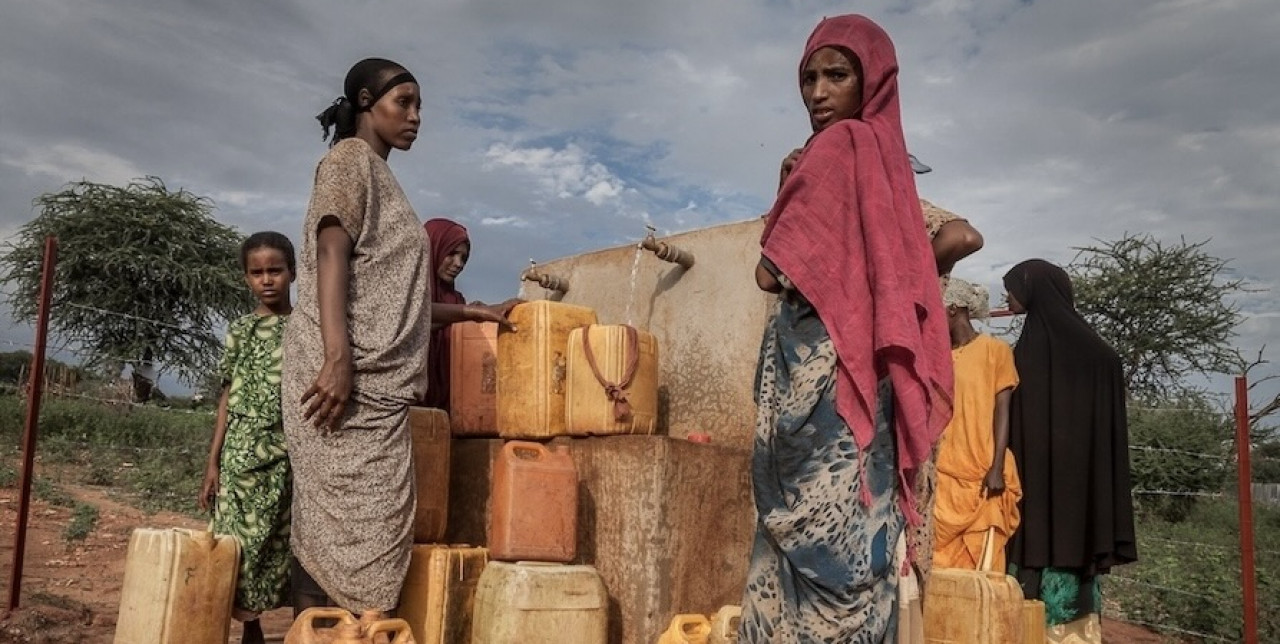15-01-2024 | di COOPI
Ethiopia. Supporting people affected by the conflict
As violent clashes in Amhara Regional State in northern Ethiopia continue to exacerbate the humanitarian emergency, COOPI is supporting and assisting the displaced population and host communities with financial support from the Italian Agency for Development Cooperation (AICS). The goal of the project is to contribute to the improvement of the conditions of people affected by the conflict, as Andrea Canneti, head of mission at COOPI, tells us.
In what context does the project take place?
The escalating violence that has affected Ethiopia since 2022 has created massive displacements of people, damaged much essential infrastructure in urban centers, and disrupted trade and thus people's livelihoods. As a result of the hostilities, which affected not only Tigray but also the Amhara and Afar regions, 4.4 million displaced people in 2023 were in temporary shelters or in host communities across the country(OCHA, 2024).
The combined effect of the COVID-19 pandemic and conflict-related destruction has greatly increased the risks of spreading infectious diseases in the country, all compounded by the shortage of available drugs and health services. In addition, access to water is severely compromised in North Shewa and Oromia Special Zones in the Ahmara region, especially due to the disruption of electricity services or the looting of electromechanical systems that ensure water pumping. Long queues and long-distance travel are required to access water, exposing women and girls to additional risks of violence. The main source of water supply for displaced people living in host communities is untreated water from rivers and ponds.
Finally, since August 2023, the Ahmara region has been experiencing an upsurge in conflict with armed groups facing the federal army, further increasing the numbers of internally displaced persons (IDPs) and water, sanitation and health needs.
What are the activities that COOPI is carrying out to deal with the emergency?
Through the project "Integrated Assistance and Resilience Support Intervention for the Displaced Population and Host Communities in Conflict Affected Areas of Amhara Regional State," COOPI together with its partners, CUAMM and ERSHA, aims to support IDPs and host communities by restoring access to water, providing first aid items, improving hygiene practices, and engaging in prevention of major communicable diseases. To do this, we work to re-establish sanitation facilities in health centers and schools, installing pumps and water lines and building or rehabilitating disused latrines.
Through a careful assessment of needs in the target area (North Shewa Zone and Special Oromia Zone) we were able to analyze the complexity of the displacement situation and monitor the gradual return of a large number of displaced people. For these reasons, COOPI rehabilitated the water supply systems of a health facility and a school in the Shoa Robbit area and a school in the town of Debressina, infrastructures, these, affected by the previous conflict. In the same way, COOPI replaced the water system pump in the town of Debre Birhan in North Shewa Zone, which was also damaged by the conflict.
In addition, COOPI worked to give direct support to IDPs through interventions that would enable them to improve and consolidate the resilience strategies of conflict-affected families. To do this, COOPI distributed multipurpose cash to 600 beneficiaries and provided funds to rent housing to 250 displaced families. These activities related to improving the economic situation of displaced persons and host communities are estimated to have reached a total number of 20,208 displaced persons and returnees (8,020 men, 8,349 women, 3,839 minors) and 14,043 people in host communities (5,574 men, 5,801 women, 2,668 minors).
What are the expected results of the project?
Through these activities and collaboration with project partners (CUAMM and ERSHA), COOPI aims to structurally and functionally restore urgent resources and services necessary for the recovery of decent livelihoods and livelihoods of IDPs and host communities in North Shewa and Oromia Special Zones in Amhara Regional State. To do this important is to continue to ensure access to water and improve hygiene practices for IDPs and host communities, ensure reproductive health services, prevention and treatment of major communicable diseases, and finally improve access to resources and tools to facilitate early recovery and consolidate resilience strategies for conflict-affected households
COOPI has been present in Ethiopia since 1995 providing assistance to save lives and help communities recover from shocks through interventions to improve basic services and support livelihoods. COOPI has introduced best practices in Wash and FS&Livelihood services to support the most vulnerable groups in areas of the country affected by continuous disasters, both natural and man-made, and characterized by numerous fragilities.
Ph. cover photo Coralie Maneri




 Ethiopia
Ethiopia